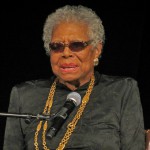This is the second book review for Banned Books Week 2015 from Gwen Osborne, Director of Public Affairs:
photo by York College ISLGP
Before her death last year at age 86, Maya Angelou had begun work on the eighth book in her multi-volume memoir.
Angelou led a colorful life that included work as San Francisco’s first African-American streetcar conductor, a brothel madam, an Alvin Ailey dancer, a civil rights activist and a poet. I Know Why the Caged Bird Sings, published in 1969, is the first book in the autobiographical series.
The book recalls events in Angelou’s childhood in Stamps, Arkansas and St. Louis, Missouri. Like many works in African-American literature, birds are used as a metaphor for freedom. I Know Why the Caged Bird Sings takes its title from a line in Paul Laurence Dunbar’s 1899 poem “Sympathy.” (In 1983, Angelou published her own poem, “Caged Bird,” as a variation on that theme.)
Despite spending two years on the New York Times paperback bestseller list and being nominated for a National Book Award, I Know Why the Caged Bird Sings is one of the most banned and/or challenged books in America for its language and portrayals of violence, racism, sexuality, childhood rape and teen pregnancy.


1. That book is not allowed to be sold or held in public libraries.
2. The depictions of violence, rape, murder, and racism in the book, Along with the political views of the author.
3. language and being too explicit in depictions of rape, and being “anti-white”
2022, I can’t believe that someone would actually think this is correct. Many books talk about Teen pregnancy and for the most part this book spends little time on the topic. Racism, if anything the discussion of whites is nothing more than historical facts. Rape, I wouldn’t read it to my 5 year old but I would allow my 12 year old to read it,learn from it, and build compassion.
This is a simple reminder that white men are scared. They have to be in control. Fortunately not all white men are like this but for the ones who are, I pity their ignorance We all fight for freedom even when feel beaten, we still get up one more time as Mya explains how Joe Lewis won what seemed like a lost cause, he didn’t give up.
This book, beautifully written, and will stay with me the rest of my life. I only wished I had read when I was younger.
Out of all the trash out there including much of prime time television, this book was very badly judged.